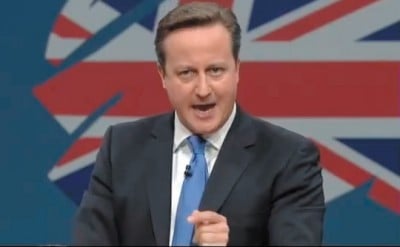British Austerity: Cutting One’s Own Backyard

“Have you ever wondered how the prime minister sleeps at night?” George Monbiot, The Guardian, Nov 11, 2015
David Cameron assumed a different hat earlier this month when writing a letter of protest about cuts to his local council in Oxfordshire. This provided endless opportunities of biting satire, but it also provided one ample illustration about power and distance. When his Tory hat appears, with all its blue bold vengeance, the slasher of services is what manifests. Deficits are demonic reminders of a poor economy (this has proven false constantly in so far as deficit spending rationales are concerned, but leave that aside), while the expenditure by government for such services is treated is an inconvenient variation of modern bread and circuses.
On going home to his constituents in Oxfordshire – something he does so less these days, his feeling is that of local resident, affected by the council’s own range of services (or not, as the case may be). This may also be the usual exceptionalism shown by a local member – the Westminster system gives us that most quirky of ideas that the prime minister is himself a member of the Commons rather than a separate arm of government. Not insulating the executive function from the legislative one produces its own host of problems.
The leaked letter that came out earlier this month in the Oxford Mail showed the prime minister expressing disappointment at the reductions to a range of services in the constituency. Addressed to the Tory-run Oxfordshire county council, notably Ian Hudspeth, its leader, he admonished the members for what was, essentially, an accepted Tory practice, hewn in granite. The latest cuts were extensive, and go deep into “frontline services” – elderly day centres, libraries and museums. “This is in addition to the unwelcome and counter-productive proposals to close children’s centres across the county.”[1]
Cameron, after ticking Hudspeth off for his zeal in application, suggested that savings might be made in back-office functions and the sharing of services. Why not, chided the PM, “generate savings in a more creative manner”?
The prickly reply was that the council had already taken the shears to such back-office functions and considered savings back in 2006. The effects had been devastatingly effective, reducing staff numbers by the thousands (2800 to be more exact), and the disposition of property.[2] Oxfordshire was truly lean, and heading for fiscal anorexia.
As for the latter, disposing of available property “is neither legal, nor sustainable in the long-term since they are one-off receipts.” If you sell the family silver, you are unlikely to come across them again, accept in someone else’s cabinet.
Then followed a lesson of fiscal realities, one delivered with point blank lecturing. “Excluding schools, our total government grants have fallen from £194m in 2009/10 to £122m a year in 2015/6, and are projected to keep falling at a similar rate. I cannot accept your description of a drop in funding of £72m or 37% as a ‘slight fall’.”
Figures are constantly disputed, with Cameron obviously reading from a different brief, supplied with severe alterations from the Osborne fantasy machine. In one instance, he claims that the total value of cumulative savings in the county since 2010 come to £204m. Not so, shoots back Hudspeth. That total is an annual, not cumulative one. The savings, in fact, have amounted to a staggering, eye-watering £626m.
This bruising revelation was a constant reminder that throughout Cameron’s tenure, cuts have taken place even as grants from a centralised funding structure have fallen. In the jaundiced world of the chancellor, George Osborne, these come across as “small” reductions, really nothing to fuss over. Effectively, councils are being savaged on two fronts even as local government becomes more impoverished. With no where else to go for the slashing platoons doing their bit for balanced budgets, frontline services are up for the chop. Local government emaciation is here to stay.
Hudspeth was also saving up a little reminder for the PM. He had been, he pointedly noted, a suitable warrior for Cameron’s cause, a true ideologue who “worked hard to assist you in achieving a Conservative majority.”
The battles of funding and services in British councils should not be breezily dismissed as the candy of first world problems. These are the expectations that have grown up in a State where certain services do matter. And the bifurcated world Cameron straddles in this case is significant in more ways than one. As George Monbiot suggested, the prime minister “hasn’t the faintest idea how deep his cuts go. This letter proves it.”[3]
The anti-austerity shadow chancellor, John McDonnell, could not resist pouncing on the revelation. “I’m backing David Cameron on this one. He is absolutely right that his chancellor’s cuts to local government are seriously damaging our communities and have to be opposed. I welcome the prime minister as another Tory MP joining our campaign against George Osborne’s cuts.” The campaign of reality, if you will.
Cameron’s indignation is a brilliant, if somewhat ghastly example of distance between planning and effect, a form of remote policy that takes root in cult and fantasy. Having seen the devilry of his own handiwork, the Osborne architecture of doom, he has recoiled. The mirror has spoken.
Dr. Binoy Kampmark was a Commonwealth Scholar at Selwyn College, Cambridge. He lectures at RMIT University, Melbourne. Email: [email protected]
Notes
[2] http://www.theguardian.com/politics/2015/nov/11/cameron-hypocrisy-cuts-letter-oxfordshire-council
[3] http://www.theguardian.com/commentisfree/2015/nov/11/david-cameron-letter-cuts-oxfordshire

